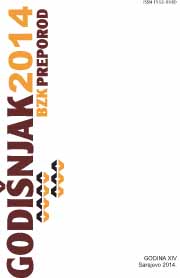Politička kultura na Balkanu i savremeno shvatanje bošnjaštva
POLITICAL CULTURE IN THE BALKANS AND CONTEMPORARY UNDERSTANDING OF BOSNIAKHOOD
Author(s): Goran BašićSubject(s): Social Sciences
Published by: Bošnjačka zajednica kulture "Preporod"
Keywords: Balkan; political culture; Bosniaks; identity
Summary/Abstract: Contemporary geopolitical changes in the “Balkan bazaar” break down old walls, but also raise the new ones. Described as a place of meeting and inosculating of great religions and cultures, Balkans corresponds less to that romantic stereotype. Islam, Christianity and Judaism; Mediterranean, the Orient and Levant transferred to the Balkan peoples Ancient, Byzantine, Islamic and Hebrew tradition. On the foundations of ancient cultures it was built limited civilization, with defined cross and crescent; the Bible and the Quran; and Hellenophilia and Pan-Slavism. Archaeological, linguistic, ethnological, historical heritage point us to the close culture of Southeastern Europe nations. However, it seems that there is no division and separation nowhere so pronounced as specific as among close nations. The points of cultural and religious contacts were the reason for the division, conflict, hatred, and in such situations the closeness of language, religion and customs were a load that had to be rejected and replaced with new, more severe, and substantially poorer. The ethnic and national identities that were believed to have vanished in the wilderness of ideological voluntarism were revitalized in such social relations. Although the recognition of identity should seek only among themselves, members of these ethnic groups tend to set their limes between his and neighboring cultures. In that process, the biggest allies of them are those who dispute their identity.
Journal: Godišnjak Bošnjačke zajednice kulture »Preporod«
- Issue Year: 2014
- Issue No: 1
- Page Range: 220-227
- Page Count: 8
- Language: Serbian

